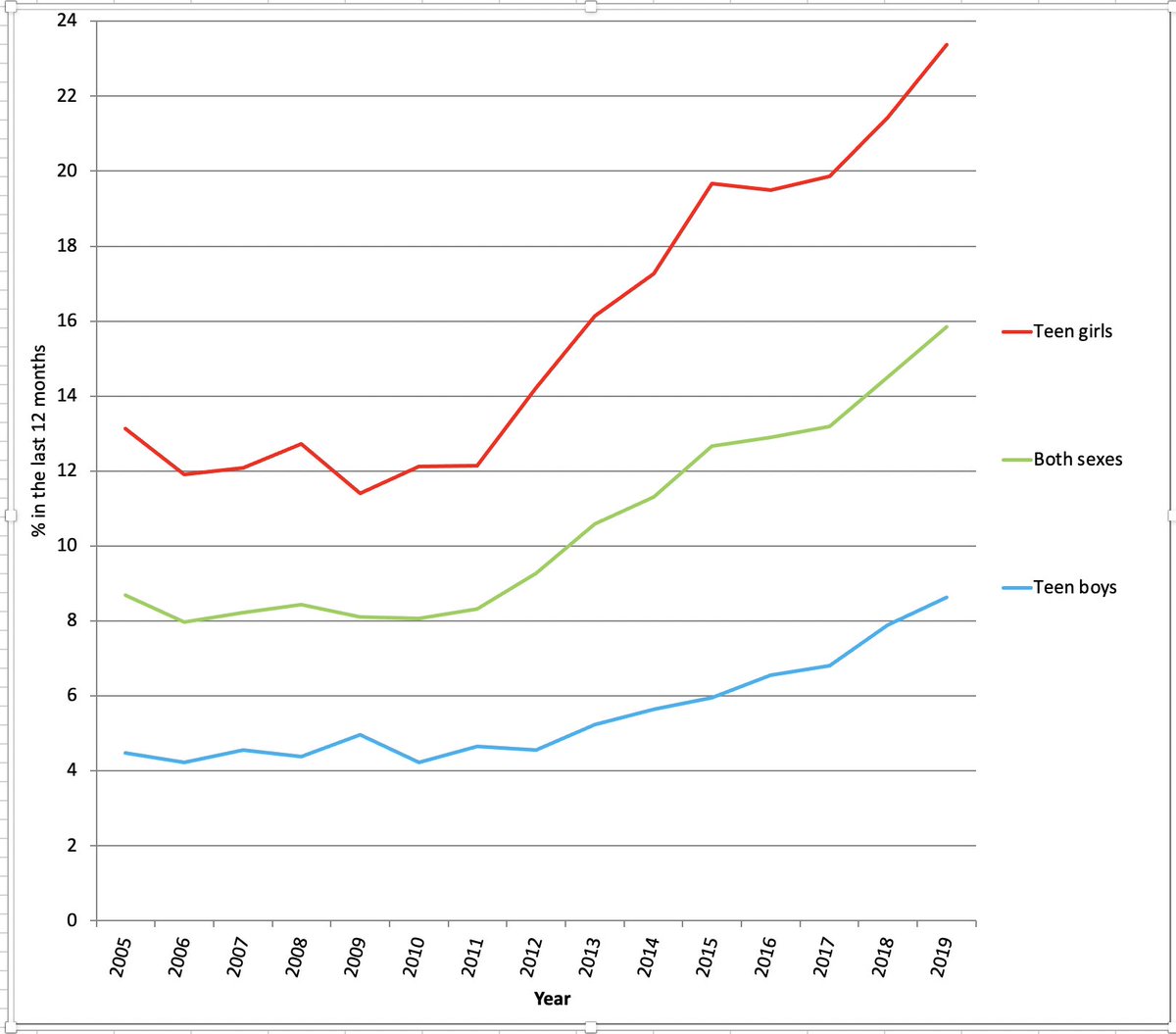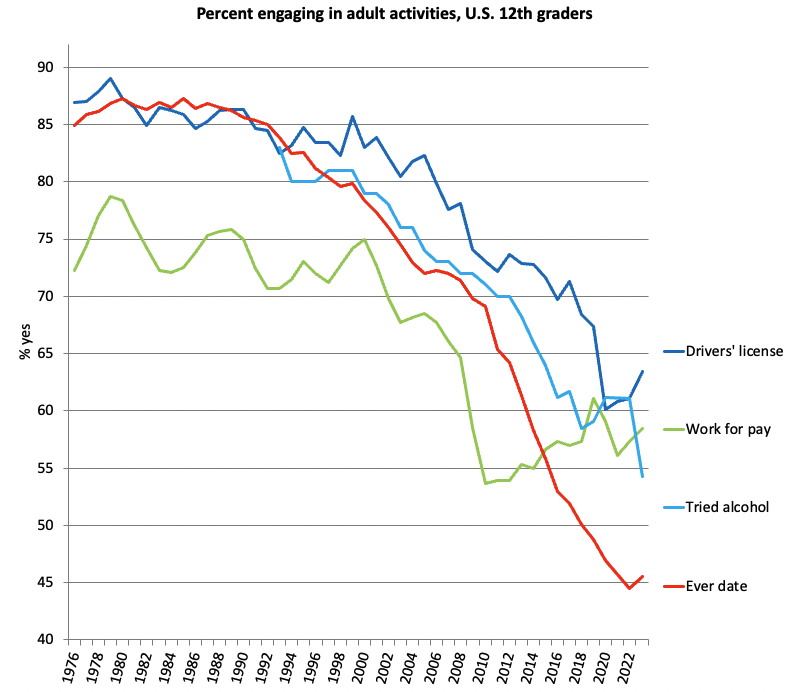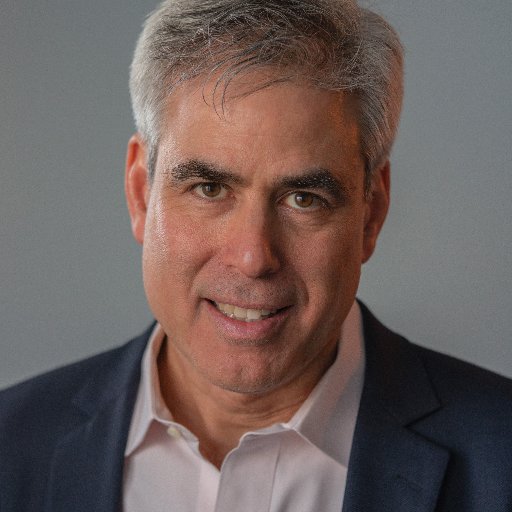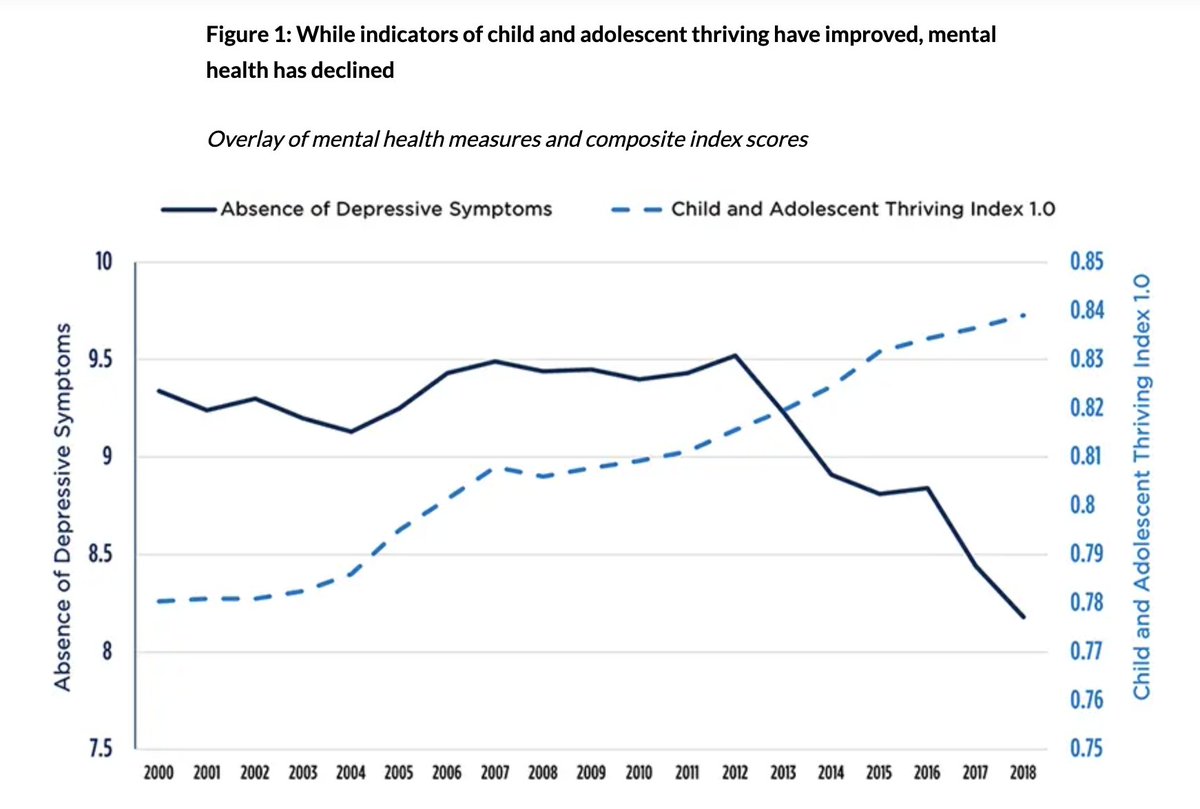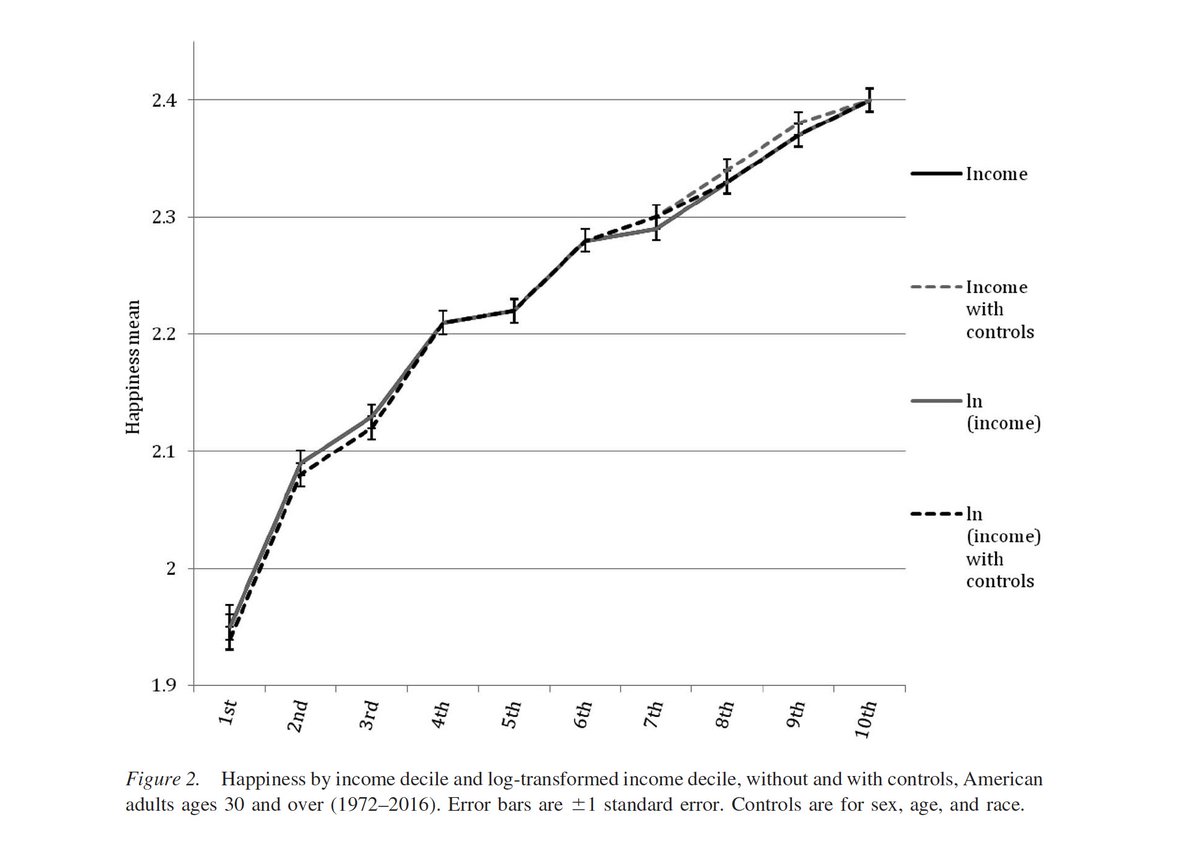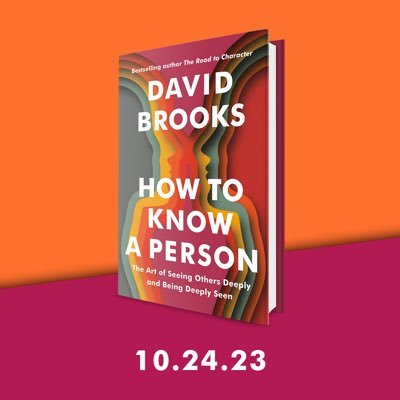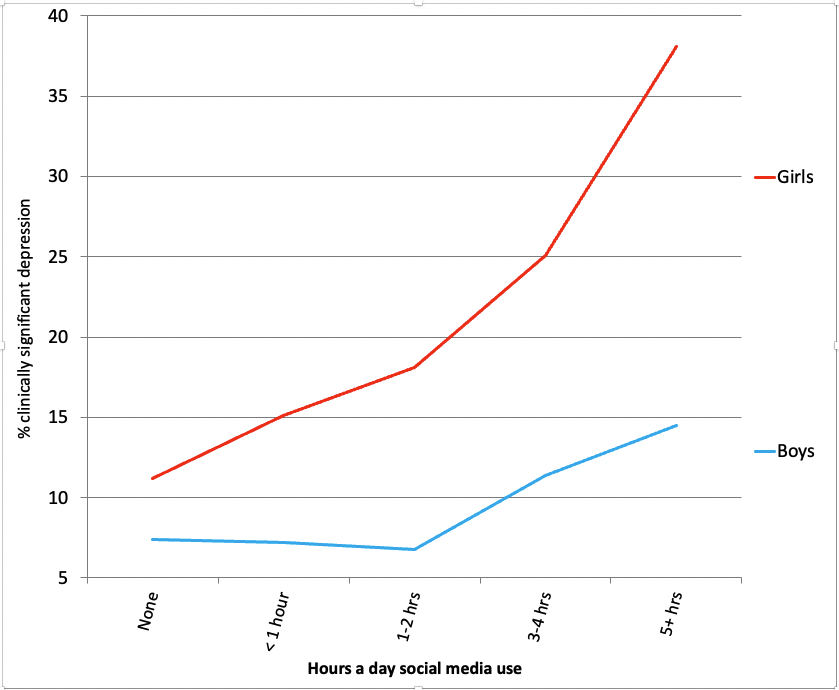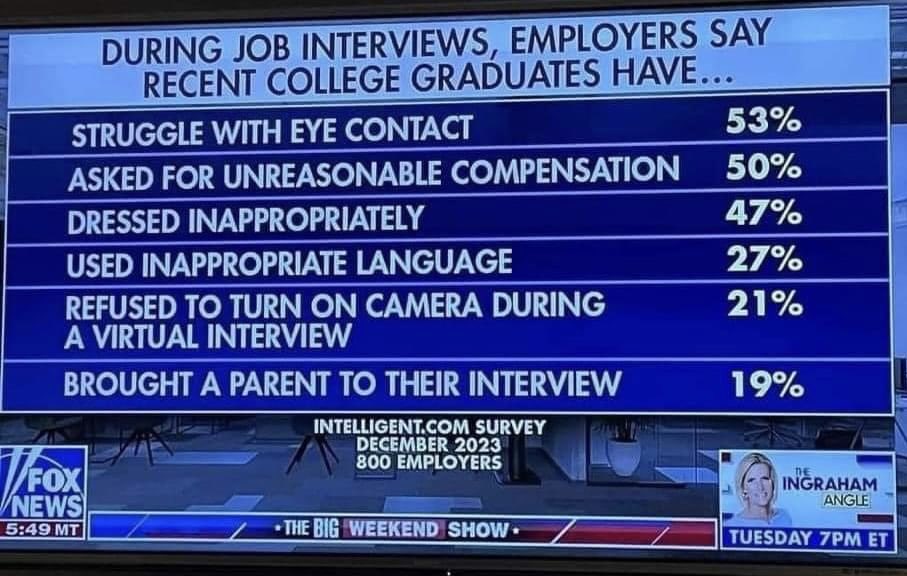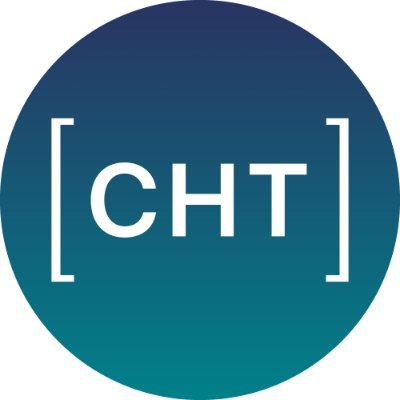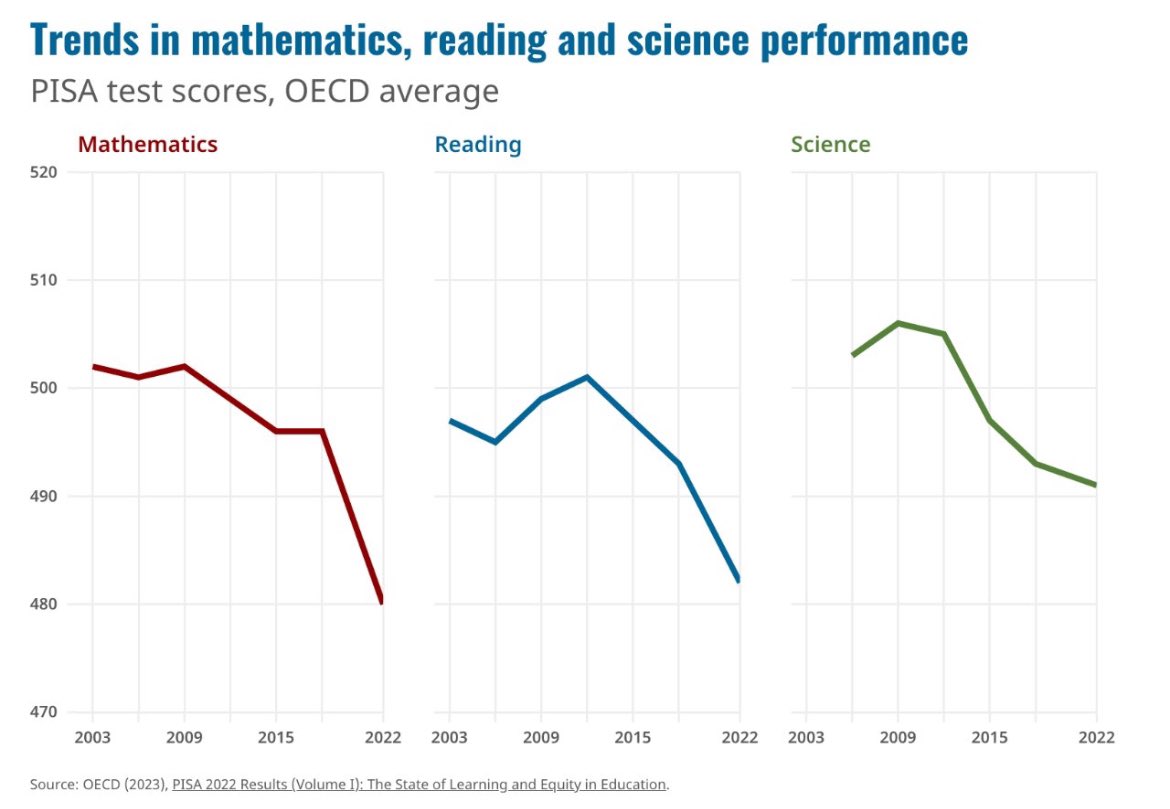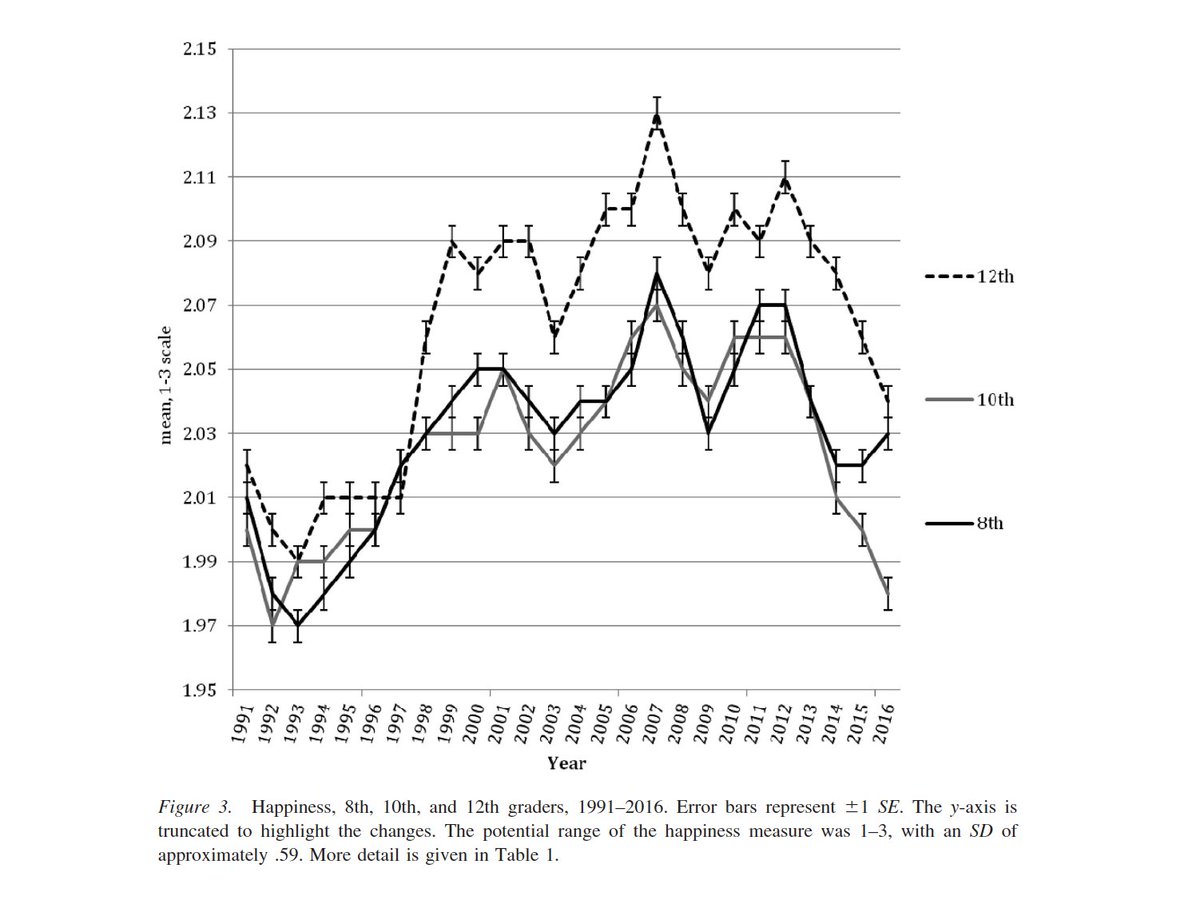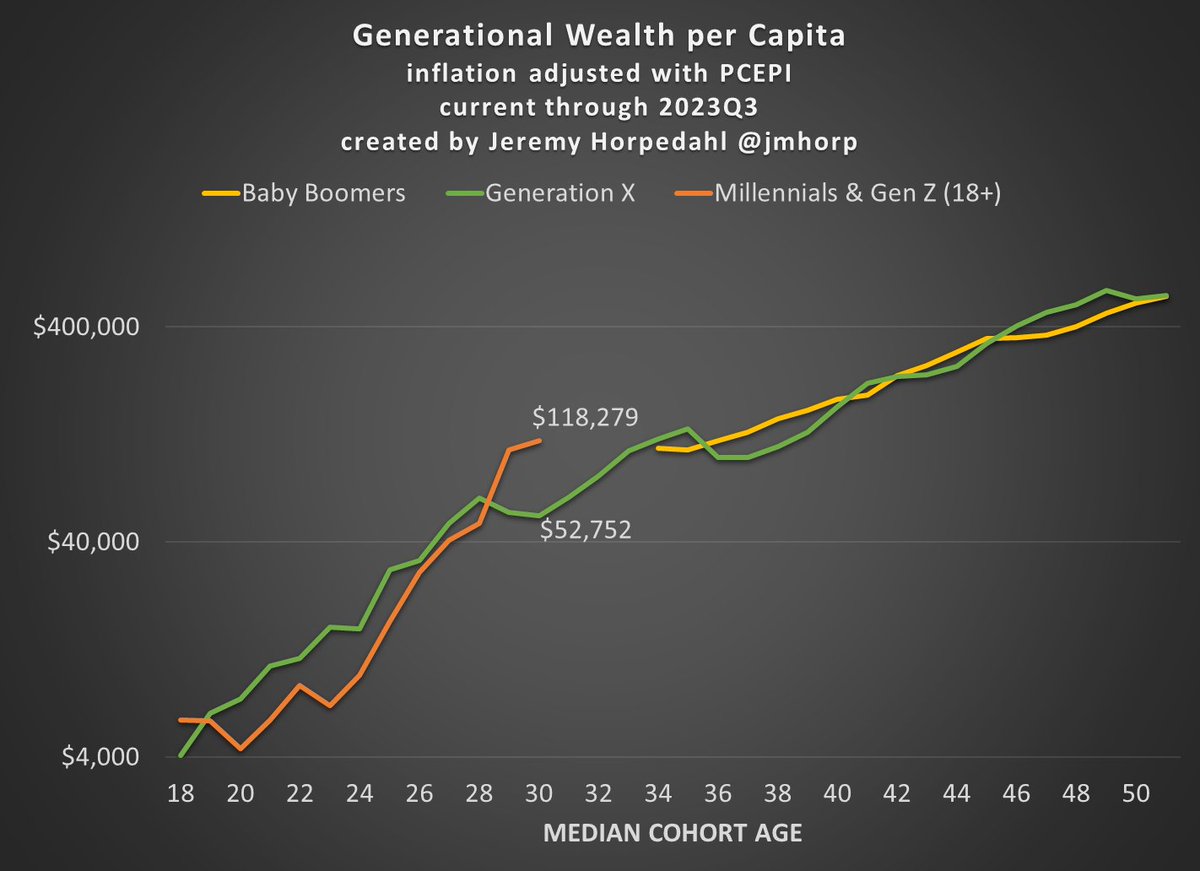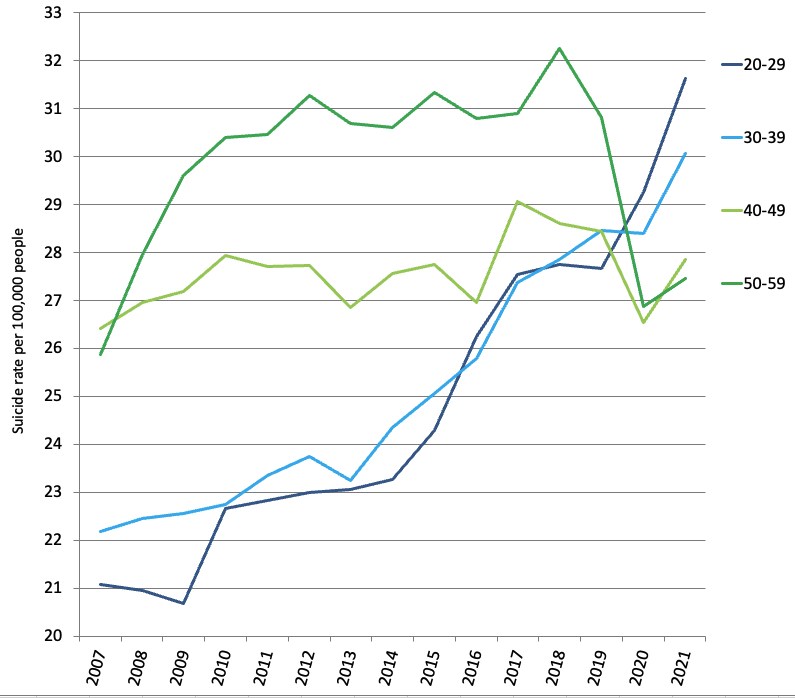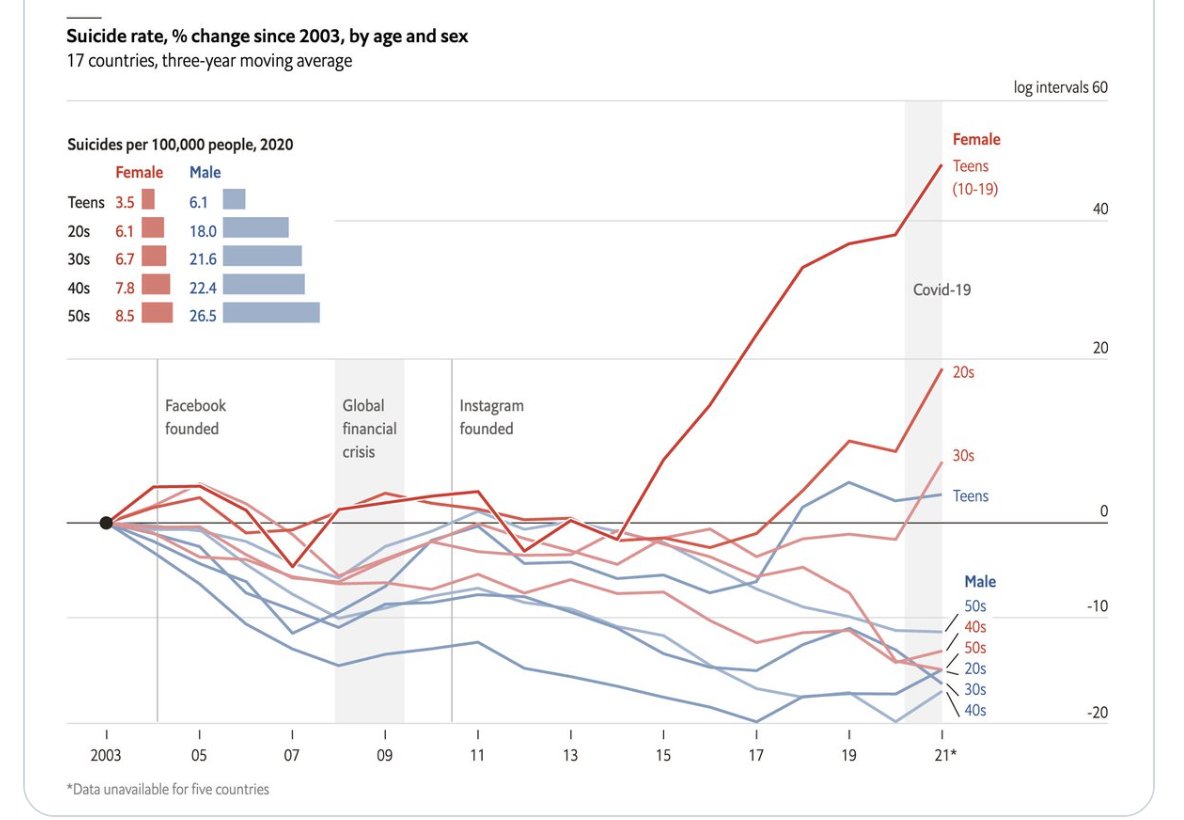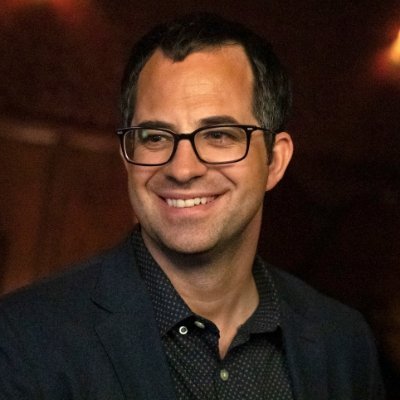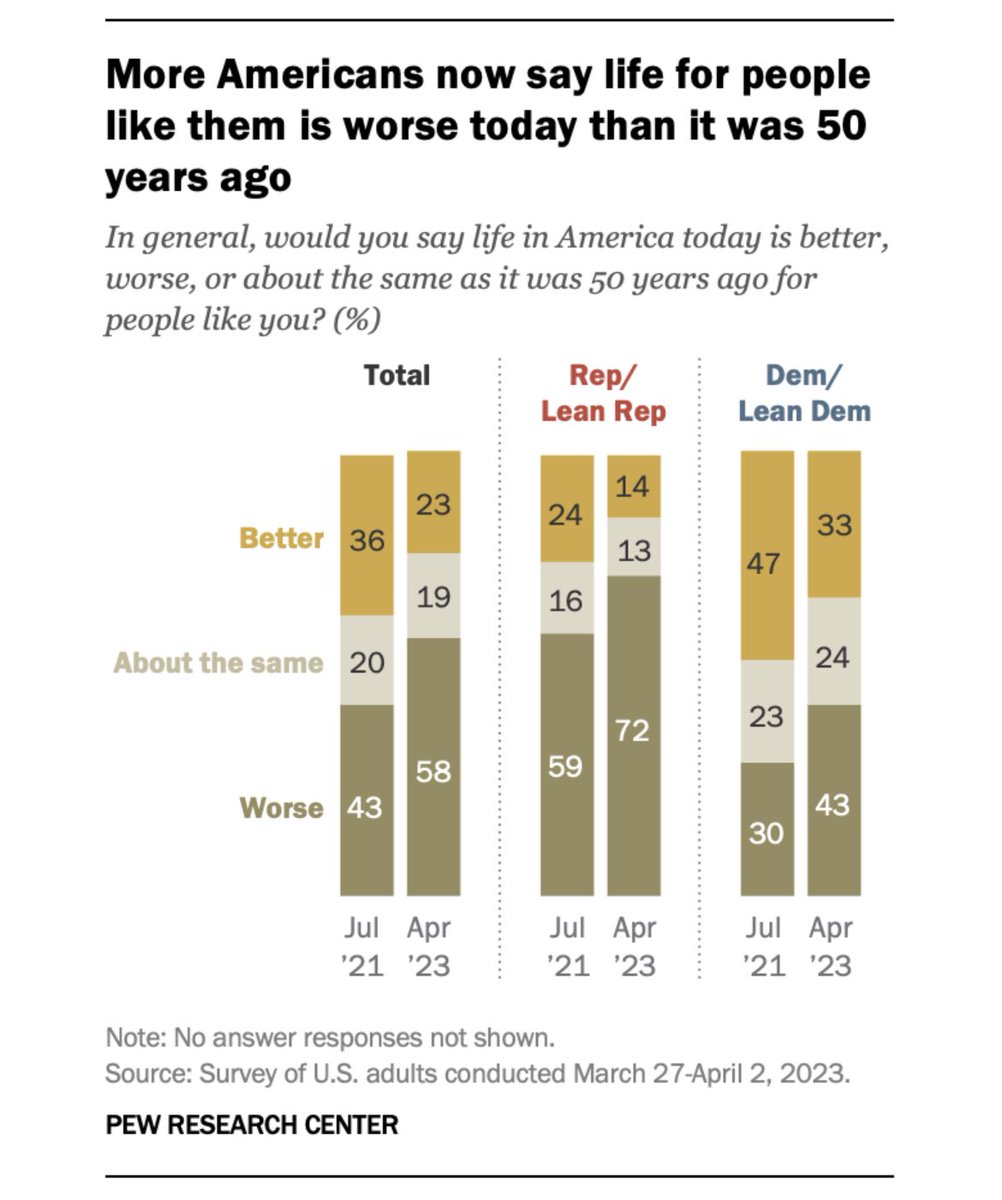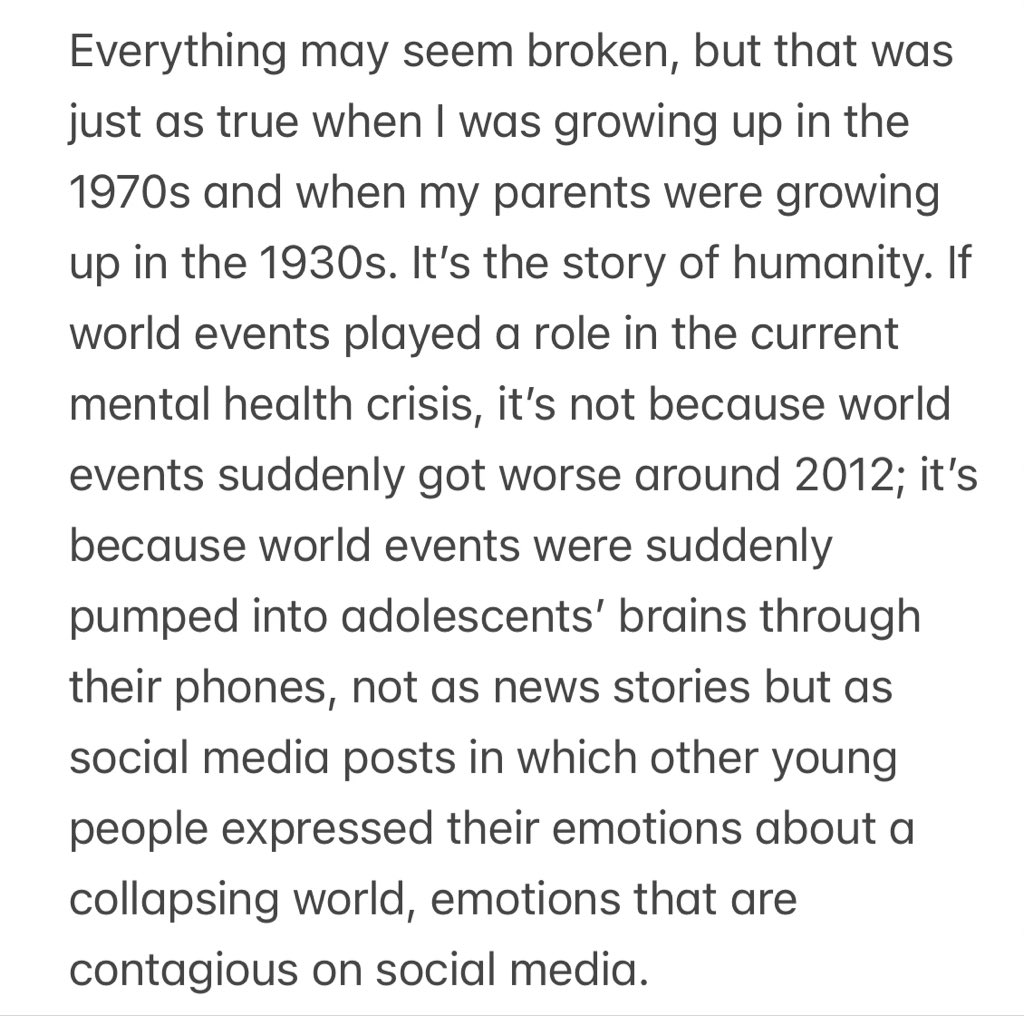
Jean Twenge (author of GENERATIONS, iGEN)
@jean_twenge
Followers
17K
Following
4K
Media
251
Statuses
5K
Mental health, social media, Gen Z at work, trends. Professor and speaker. Newest: https://t.co/nAzNtRqybI Generations book: https://t.co/iiXdzD9Hlf
San Diego, CA
Joined April 2017
This is stunning -- Chinese kids under 14 primarily see educational videos on TikTok and are limited to 40 minutes a day. The U.S. version is a free-for-all and has no time limit.
“It’s almost like [Chinese company Bytedance] recognize[s] that technology’s influencing kids’ development, and they make their domestic version a spinach TikTok, while they ship the opium version to the rest of the world,” says Tristan Harris.
118
816
3K
Why is the teen birth rate falling? Because #iGen is growing up more slowly. It's not just sex and pregnancy; it's also driving, working, drinking alcohol, and going out -- it's all done later.
111
168
639
Two personality psychologists trying to make sense of the weirdness of this cultural moment: Why online culture is so often toxic & why teens are taking longer to grow up (and lots more). My recent discussion with @jordanbpeterson: .
23
79
659
"Everybody knows" Millennials got screwed by the economy and will never own homes. Surprised to find that's not true: Millennials actually make *more* money than Gen X & Boomers did at the same age. More in the excerpt of my new book, Generations, out in The Atlantic today:.
Studies show that Millennials, despite a rough start, are now thriving financially, @jean_twenge writes. What if the American dream is still alive, but no one believes it to be?
651
70
437
Dating is definitely in crisis mode among U.S. 17- and 18-year-olds. Data from Monitoring the Future (graph is an update of Figure 6.16 in *Generations*) @DKThomp
"Young people in America aren't dating any more, and it's the beginning of a real social crisis" is—I mean, let's be honest—exactly the sort of social phenomenon I would want to report the shit out of. But . what's the best evidence that it's true?. Just one e.g.:
29
72
445
This is what is remarkable: Teen pregnancy, crime, physical fights, and child poverty are all down since 2010, but teen depression doubled. It should have gone down -- but it didn't, because smartphones and social media led to social isolation & sleep deprivation.
The teen mental health crisis was not caused by reality getting worse around 2012. Their material and physical health improved steadily. To paraphrase Epictetus: "It is not events which disturb teens. It is the device through which they interpret all events."
18
130
432
This is what happens when we give individualistic advice like "You shouldn't care what anyone else thinks of you." It's meant to encourage self-confidence, but if you truly don't care about others' views, rudeness and anti-social behavior are the predictable result.
The most important story about why Americans have become sad and alienated and rude, I believe, is also the simplest: We inhabit a society in which people are no longer trained in how to treat others with kindness and consideration.
19
72
354
I'm seeing a lot of posts suggesting this doesn't account for the higher cost of living. But it does: The numbers are median income *corrected for inflation*. In 2021 dollars, Millennials are making more money than Gen X'ers and Boomers at the same age. 🧵(1/3).
Studies show that Millennials, despite a rough start, are now thriving financially, @jean_twenge writes. What if the American dream is still alive, but no one believes it to be?
58
48
333
This is a crucial point: Teens who quit social media feel left out, and those who stay on often grapple with mental health issues. You can't win. Social media is social. We need group solutions, not individual ones.
WSJ also shared how FB *knows* Instagram's design drives a downward spiral in teen mental health– worse than Snapchat, TikTok. Facebook is worse than Big Tobacco. A single person can quit cigarettes. Instagram *preys* on social exclusion. Kids feel ostracized if they quit.
6
84
291
@jmwooldridge No, you are completely correct. Very important distinction. A shift from 3% to 6% is a 3 percentage point change but a 100% increase.
3
15
290
Parents: Does this look negligible to you? Twice as many heavy users of social media are depressed vs. non-users, 3x among girls. (From the UK Millennium Cohort Study of 15-year-olds). And yes, there are experiments showing causation as well.
Smartphones aren’t ruining your kids’ mental health. Studies have found the link between screen time and depression to be negligible. This is one of many convenient myths we parents accept instead of digging deeper into complex behavioral issues. Keep reading for 3 more myths.
18
97
286
This is INSANE!!.
SMARTPHONE BAN.In the US, a teacher (Mary Garza) instructed her students to set their phones to loud mode. Each time a notification was received they’d stand up & tally it under a suitable category. This occurred during ONE class period. Each mark is a learning disruption #edchat
18
70
276
Wow, this is a terrible idea ("silent lunch"). Kids & teens already don't get enough time to socialize face-to-face, and now we're going to tell them they can't talk at lunch in school?.
Child development much?. A "top" school in NC enforces silent lunch because admins "found that 15 minutes was not enough time to eat if the children were allowed to talk.". Less talking = more instruction time! Better test scores! All that matters!.
16
30
235
Q: What fraction of 1994 teens read 10+ books for fun per year?.A: Twice as many as in 2022. Reading started dropping in the '70s, resurgence '00s, then back down. End result: All-time lows. From Monitoring the Future (nationally representative survey) @paulg
@paulg I wouldn't be surprised if teens read more per day today than they did 30 years ago. But it's in different locations than 30 years ago. I suspect there are some very positive effects of this, and some very negative. I'd love to know what fraction of 1994 teens read 10+ books.
17
78
233
Exactly. This is the image I show in my talks at schools, with the line "Would we let students bring TV sets to school?" That's how it would have looked. And phones can do everything a TV can and more. No phones during the school day bell to bell just makes sense.
Most states are taking action toward making their schools phone-free. It's totally bipartisan. It's also common sense. When I was in school, we were not allowed to bring in our televisions and watch during class.
10
42
233
Among teens, every screen activity is correlated with less happiness, and every non-screen activity (except working) is correlated with more happiness. Out today in the @APA journal Emotion.
5
129
168
Check out this brilliant demonstration of the compulsion to use social media -- even if you don't like it.
An excerpt from “We’ve Been Sneaking Into Your Brains” @HumaneTech_ Head of Education, @MaxStossel's talk to 800 middle and high school students in Braintree, Massachusetts.
5
64
162
I can think of a few things that changed in teens' lives around the world in 2012 and after that might have an impact on learning . .
What is HAPPENING here?. Between 2012 and 2023, it appears that average OECD reading, math and science scores have declined consistently. This is not (just) about pandemic learning loss. It’s not about one US city. It’s not even just the US. This is the entire developed world.
8
51
172
It's difficult to describe the increase in young adults identifying as transgender since 2014 in words. The graph captures it much better. Data from a CDC survey. More in *Generations* and the excerpt in @TIME:.
42
47
157
What do happy teens do? Correlations between teen activities and their self-reported happiness show some interesting patterns. My latest @PsychToday:.
3
82
142
The implications of the mental health crisis among Gen Z and Millennials in the U.S. and Canada: My latest in @globeandmail. Based on the research in *Generations*:.
14
39
138
After rising 1991-2012, teens' happiness suddenly plunged 2012-2016. Unusual to have such a quick generational shift -- in this case from #Millennials to #iGen. In the @APA journal Emotion, out today.
13
78
125
I do have that data, and extracurricular time in high school is basically unchanged 1987-2019 among those going straight to a four-year college. Homework time is also about the same. Fewer have paid jobs, and they spend less time out with friends. So teens have more time, not.
I don't have data on the hours that well-off kids spend on extra curriculars now vs. 1994 or whatever. But with travel sports and looks-good-on-college-application-activities, it wouldn't surprise me if ambitious kids are doing things other than reading w/ their spare time.
6
38
131
Very consistent with the charts in the Millennial chapter of *Generations*: Millennials and Gen Z are doing very well financially despite the extremely common idea that they will never catch up to previous generations. They already have.
Major update to the Generational Wealth chart. Based on the updated SCF data, young people have a lot more wealth than we had previously thought. Millennials and Gen Z have dramatically more wealth than Gen X had at the same age, and it's growing fast!.
10
33
121
A very important article about one of the biggest generational / cultural shifts out there: We now spend more time alone. That's due to technology as well as individualism, and it's one of the major reasons we have a mental health crisis.
4
27
123
Could not have had a more fantastic time on the @RealTimers show with @BillMaher talking about *Generations* last night! So rare and appreciated to have an in-depth discussion of people & ideas on TV.
#StartTheClock: Tonight's episode of Real Time with @BillMaher feat. Dr. @Jean_Twenge, @AnnCoulter and @VanJones68 is now on @HBO! . Watch the conversation continue after the show on #RTOvertime at 11:30pm ET on @CNN.
13
9
111
For the critics saying the absolute numbers of teen girl suicides are small: But the number with clinical depression is *not* small: 28%, up from 12% in 2011. That's *3.6 million* U.S. girls. But we also have to examine suicide as the critics dismiss the depression stats as
@Leesplez The increase in teen girl depression is large in absolute terms. Critics said that could be due to more liberal diagnosis and greater awareness. So that’s why Haidt is focusing on suicide. The small absolute increase in suicide supports a large absolute increase in depression.
9
37
117
The vocabulary skills of U.S. college graduates declined 1972-2016. Vocabulary is a key part of verbal IQ. New study with @wkeithcampbell & @RyneSherman in the journal Intelligence:.
9
57
95
Negative news gets clicks, so becomes more common. The result: Pervasive pessimism disconnected from reality. Many believe the economy is terrible (even when it's not) and are certain this is the worst time in history to live (when in many ways it's the best time).
New paper: An analysis of news coverage between 1850 and 2020 finds that the news "has become increasingly negative across all states in the past half century.". Economic sentiment has plunged since 2000. Non-econ news sentiment has steadily declined since 1980.
5
31
106
On tonight! Will be discussing *Generations*, especially Gen Z and how they are different.
FRIDAY: @BillMaher welcomes #Generations author @Jean_Twenge + @VanJones68 and @AnnCoulter to Real Time @HBO!. Reply with a question and join the conversation after the show on #RTOvertime.
16
21
106
We know young kids shouldn't be on social media. So why don't their parents stop them? Because they can't. Parental permission is not required, and age isn't verified. We need more regulation, not knee-jerk "where are the parents?" arguments.
The smartphone era has brought an alarming rise in loneliness, depression, and other mental-health issues among kids. We must keep children and young teens off social media, but parents alone can’t do it. | @jean_twenge .
18
25
108
Important note: The left graph in @DKThomp's post is more about teens taking longer to grow up, which has both upsides (less alcohol) and downsides (less independence). More concerning is the decline in teens going out with friends (from the Gen Z ch. of *Generations*).
It’s mostly cringe for middle aged people to gawk at general changes in younger generations, but the anti-socialization of childhood in America is really a stunning thing to see all at once. ht @jean_twenge
5
35
103
All schools need to be doing this.
My kids go to a public middle school in NYC where they lock up their phones for the day. This is what the school observed:. “Overall, the program has been a massive success. We are happy to share that we continue to see the benefits of using Yondr, with increased student
4
27
102
Gen X has been more conservative and more Republican for their entire adult lives. One theory is that a generation's political tilt is decided by the popularity & party of the president when they are young, and for Gen X that was Reagan.
12
10
107
The Chronicle of Higher Ed (@chronicle) asks "Is this the end of reading?" In a word, yes. And college faculty are noticing.
9
26
92
Heavy social media use predicts more depression a year later, even when controlled for past depression in new large, longitudinal study of teens. Suggests at least some of association is social media --> depression. @KERiehm @JAMAPsych .
5
46
81
The decline in reading is real. (And @Educhatter is correct: It began looong before book bans).
6
29
76
Also stunning since negativity went *up* between 2021 and 2023 as the COVID pandemic waned. Why are people so negative right now? (Honestly asking; theories welcome).
This is stunning: A majority of Americans believe life today is worse than it was half a century ago. What was different — and better— about the lives of people in 1973? . And what is worse about today?
49
6
78
Common fallacy: "Because social media use and in-person socializing are positively correlated, SM can't be the cause of the decline in face-to-face socializing." This confuses individual-level effects (social kids are social kids) and group-level effects (as SM use rose over the.
Increased social media use among adolescents predicted increased time spent with friends offline in longitudinal study.
7
16
79
The perils and eventual success of doing research in the public sphere about #Millennials & change. @adamconover
0
10
69
These same trends appear when teens are asked about these activities in time-lag studies (say, Boomers as teens in 1976, Gen Z as teens in 2022 -- see *iGen* and *Generations*). So it's not memory bias. Gen Z really is taking longer to grow up, and they really are experiencing.
We asked over 5000 Americans about their teenage experiences. The generational differences are stark, and Gen Z leads the pack when it comes to loneliness. Read the JUST RELEASED report:
9
37
79
🚨 This is huge: Facebook did internal research showing Instagram is linked to mental health issues among teen girls. (& supposedly the sample sizes are massive). What does this mean?.
“WE MAKE BODY IMAGE ISSUES WORSE FOR 1 IN 3 TEEN GIRLS.” That’s a document that Facebook employees shared internally, summarizing research about teen girls who experience these issues. By me, @JeffHorwitz + @dseetharaman
4
33
71
It's bc teens are less likely to do all adult activities, not just working. This slow life strategy happens with longer life spans, and also explains why people now marry & have children later and why "50 is the new 40." Not all good or all bad, just is. (⬇️U.S. 12th graders)
A common difference I see between Gen X and millennials/GenZ in the workplace is the number of odd jobs they had in their youth. Many attribute this change to greater class divisions or the growing number of college graduates, but it seems to have much more to do with culture.
8
18
72
Love this. And a lot of experts, including me and @JonHaidt, have been saying for years we should ban phones in school bell to bell.
When we put a cell phone ban in place everyone said it would be LITERALLY impossible to enforce. I now walk the halls and cafeteria and see zero phones anywhere. I’m done listening to the “experts” when it comes to what’s possible in schools, especially when it comes to behavior.
8
21
64
Exactly -- found the same thing in the Gen Z chapter of *Generations*. Might be one of the primary drivers behind the more pronounced rise in depression among liberal teens -- they are seeing friends in person less. Liberal teens are also spending more time on social media.
1/ Weekly recreational outings have been falling for 12th-graders across the board, but this decline generally leveled off among cons. students around 2015, whereas it has continued apace among libs (who tended to go out more frequently than cons. until the late 2000s or so)
4
16
66
The rule in our house: You don't get a smartphone until you have your driver's license. Before that, only phones with no internet access and no social media. Love the suggestions here on ways to help kids be safer in the digital age. @TODAYshow .
9
21
66
The evidence is now overwhelming that depression, self-harm, suicide attempts, and suicide have increased among U.S. teens since 2012. See a summary of studies collected by @JonHaidt and I here:
4
34
67
Really fascinating, and consistent with other research on teens and young adults:.-- Wanting to have a job helping others up 2008-2022.-- Importance of "helping others in difficulty" up 2008-2019.-- Narcissism up 1982-2007, down 2008-2016.Gen Z & younger Millennials = more.
Some good news for the new year: our newly published paper finds that empathic traits have been rising in American youth since 2008.
6
17
58
As just two examples:.Is right now really worse than 2008-09 during the Great Recession (particularly for young college graduates, who were Millennials at the time)?.Is it worse than the 1960s-80s, when the prospect of nuclear war between the U.S. and Russia seemed ever-present?.
-Left: a recent NYT Instagram post.-Right: a paragraph from @JonHaidt’s latest book describing the problem with posts just like this
9
8
61


